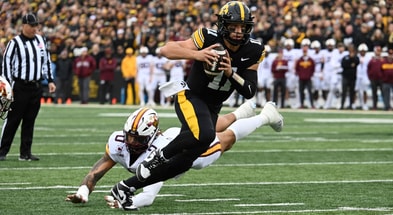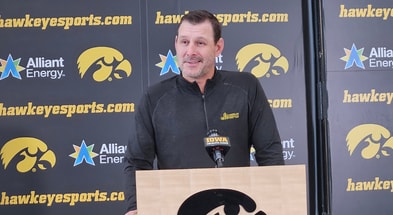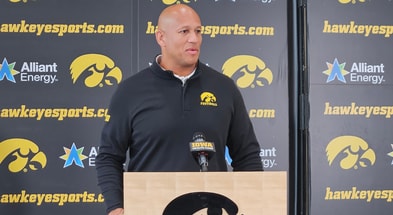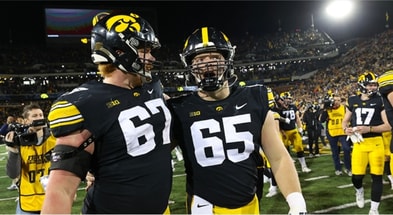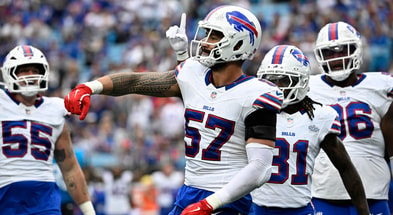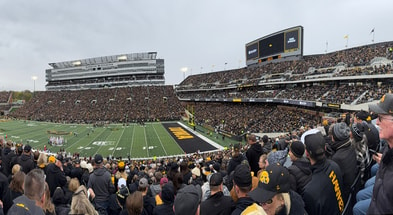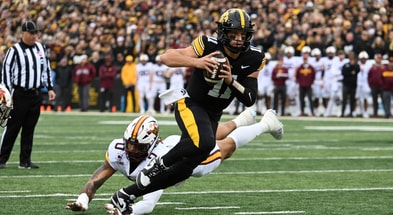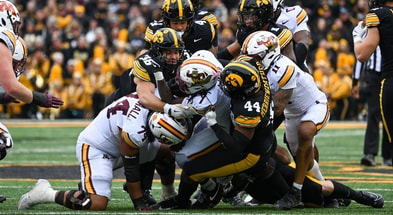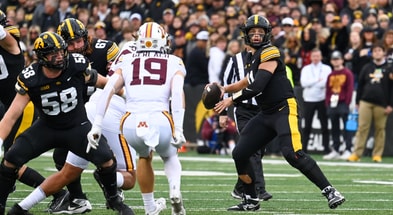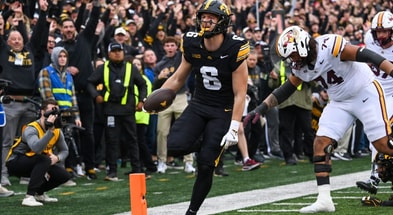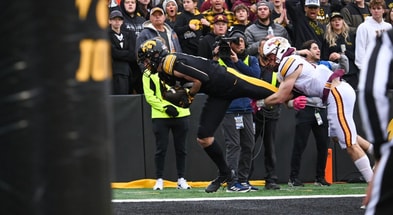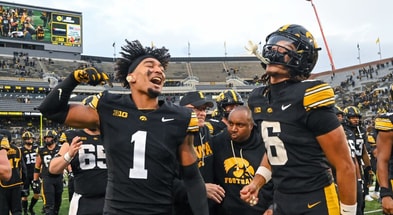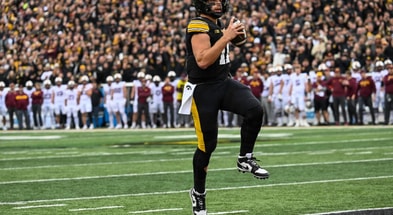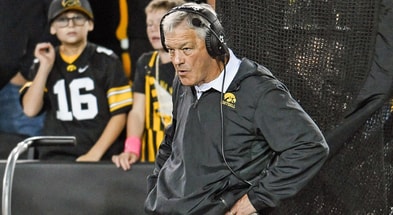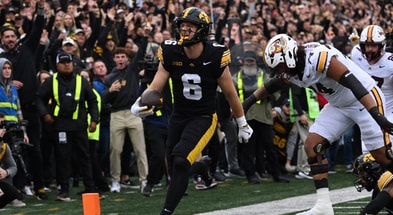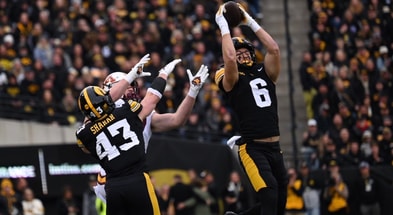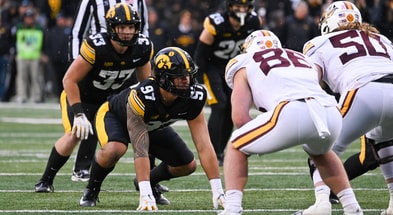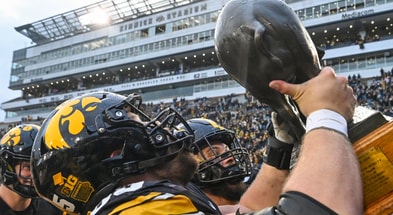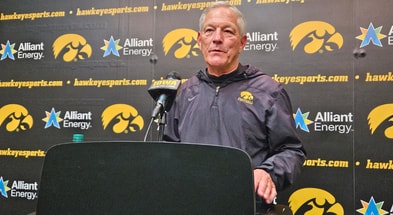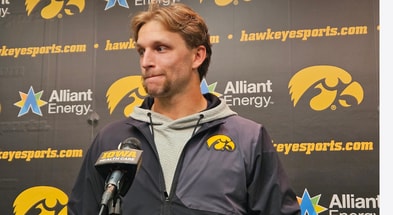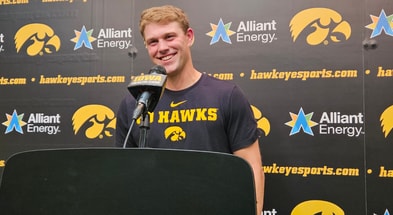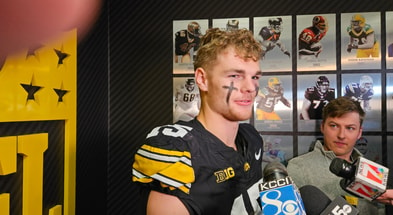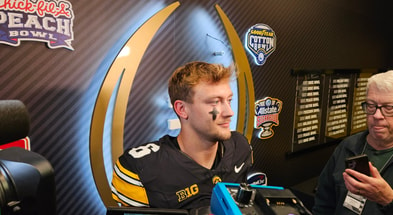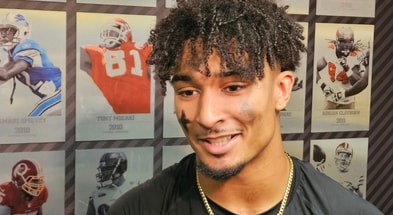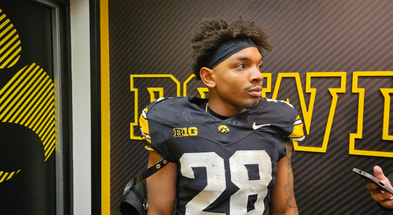Phil Parker sees improvement in Iowa's Defense
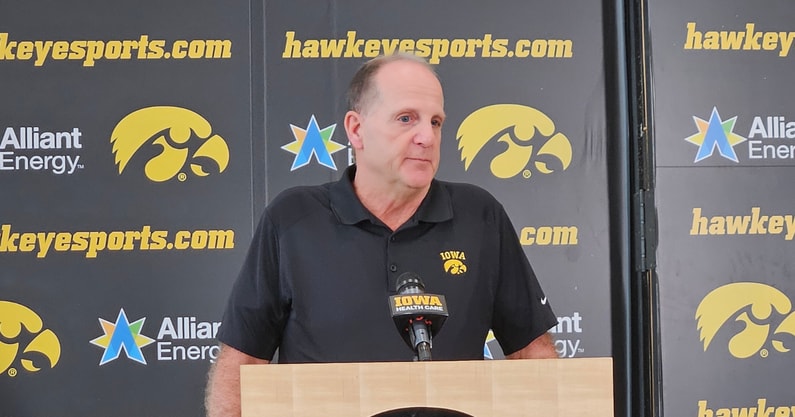
When Phil Parker last spoke to the media during the first bye week for the Hawkeyes, he was looking to see improvement in the next three games. The long time Iowa defensive coordinator saw that and more from his defense as the Hawkeyes have created more turnovers in the last three contests and saw overall improvement from that side of the ball.
Parker spoke about the situation at middle linebacker and what he has seen from the development of TJ Hall and Zach Lutmer in the secondary.
PHIL PARKER OPENING STATEMENT
Just want to say thank you guys for coming out today. There are two things that happened. I heard there’s only one bye week next year, so I only have to do this one time. (Laughter).
The good thing about it is I’m first so I have to be off in 15 minutes, so that’s another good thing.
Anyways, just to give you guys a couple notes, the last bye week we did a lot of evaluation stuff. We did some tweaks a little bit of how guys were preparing. This good three weeks over here, the last three weeks is a little bit different. Physically, guys were improving, and now this is a good time to have a bye week to look over some things in the self scout and then also preparing for the Oregon game in two weeks.
But I think our guys have been playing well. There’s a lot of improvement at a lot of different positions. Very happy the way they’ve been — the takeaways have gone up a little bit in the last three games, which I think is a good benefit of our kids working hard, and letting the plays come to you and make the makeables that you can, and I think they’ve done a good job in that.
Obviously we’ve been close on a couple of those takeaways over there getting them down to the 1-yard. We finally got one in the end zone last week with Lutmer’s catch.
But overall, I think our guys are working hard, and they’ve been working hard all the way through camp and all the way through this eighth game that we played, and we’re looking forward to the next four, which is going to be challenging.
Nowadays in college football, you see it all over, it’s week to week, and you have to make sure you keep your guys focused and they’re looking forward, and obviously they didn’t practice today, at least the starters didn’t, and then tomorrow we’ll get them up on the field and do a little bit more prep, a little bit of maybe the Oregon game a little bit, but just going back to get their fundamentals. I’ll open it up to any questions anybody has.
Q. Wanted to ask about Zach Lutmer. I know he was a guy you mentioned a couple years ago and now we’ve continued to see him ascend and arguably be one of the best defensive backs in the Big Ten. How have you seen him doing that, and especially this season?
PHIL PARKER: Yeah, it’s interesting. He’s a very quiet kid. He has great athletic ability, good footwork, and he sees things faster than a lot of other people. That comes from repetition, and when you start going out into the recruiting road, you look for those guys that play multiple sports like he did, played different positions, quarterback, plays basketball, does all those things.
He has the ability to diagnose plays a little bit faster, and he has been improving. Great kid to work with. Doesn’t say very much. He’s been very productive for us.
We’ve been moving him around to a lot of different positions. I think he can play five positions, so I’m very pleased the way he’s working.
Q. I’ve seen more disruption out of your front four, your defensive line the last three weeks since the first bye. Is that schematic or is that more them applying the fundamentals that they’ve been taught and improving in that area over the second part of the season?
PHIL PARKER: Well, I think it’s twofold there a little bit. Obviously they’re getting more work up front. That’s helping them. They’re starting to understand the game a little bit more. Could be based on who you play, what we’re doing in the back end, how can we cover guys up to let them get to the quarterback. Some guys get rid of the ball a little bit faster so it’s hard to disrupt him, but I think it’s a combination of both things. They’re growing, they’re improving, like we want our kids to do every week at every position, if we can keep on improving every week and always taking the standard up, and I think that’s what’s been going on with everybody, all 11 positions.
Q. Wanted to ask you about Montgomery and his play so far, what you’ve thought of his play, and does Jaden Harrell get that starting spot back when he’s fully healthy or do you continue on with Montgomery?
PHIL PARKER: I think Montgomery has done a great job. He’s stepped in. He’s been one of those guys in there. He’s been in the program, understands what he has to do. He’s been very productive, like the way he’s plays. When Harrell has come back and he’s in full go, he still has a knee brace on him, so it’s a little bit harder to move with him.
But I think you never take something away from somebody. Usually guys go out there and earn what they deserve to play, and the more he gets more comfortable and to that point, then we’ll make that decision when it’s there.
But going back to Montgomery, he’s done a hell of a job for us, and we’re pleased with what he’s done. It’s hard to do when you’re really like the quarterback of the defense and making all those front adjustments, coverage adjustments.
Q. Curious about the secondary with Coen, Xavier, Zach, T.J. and Deshaun. Why do you feel like they’re playing at the level that they’ve been playing at?
PHIL PARKER: I think the preparation, what they’ve been doing. Obviously it’s over a period of time when we started in August to now. There’s so many different reps. The connection with guys, understanding how to go out and practice and prepare.
You could go out there and try to be perfect, and that’s what you try to do in practice so you can have a chance, and then you start seeing things, it’s contagious when somebody keeps on pushing guys.
I think the group of guys that we have, they just keep on pushing themselves. It’s not like, hey, you’re in front of me or I’m behind you or anything. It’s about the success for the team. I think that’s the way everybody looks at it, and that’s the beauty about coaching. When you see that, sometimes it starts running itself. When you go into meetings, they already watched most of the film already and they know what they did wrong and they know what they did good and they know what they have to do to improve it, and I think everybody is talking — when you start going into it, there’s only four more games left, right, of the regular season, and they got to a point, we got to a position where — we’re 6-2 right now. The only thing that really matters is the next one because everybody just remembers the next game that you play.
I think they look at it like that as hey, how can I get better. I’ve been very pleased the way they’ve been handling the whole situation of the rotation with some guys or just guys going out and how they practice. It’s fun to watch them practice. You don’t have to coach effort and toughness, and I think the more they get to understand the game and get in the right positions, then you start seeing a little bit more violent tackles, more turnovers, the opportunity to get the ball back for our offense.
Q. What have you seen with Max Llewellyn over his career and where have you seen him grow the most as a player?
PHIL PARKER: I think he’s starting to understand the game a little bit. Instead of just doing one thing that he likes to do, I think he’s growing maturity-wise and understanding what he does — there was a play that happened a couple weeks ago that we practice, and we practiced it because we didn’t know if he was going to peel on the back or not. Amazing thing, it happened in the game and he peeled on him. A little bit later, but it was like his learning process of understanding what he has to do within the defense.
I think he’s a hard worker, great team player, and just like the way he hustles. You go watch some of these guys go practice every day, as a D-lineman you go out there and you’re hitting somebody every play, not like a DB where you’re hitting them every five or six plays. Those guys are going on, they have to take a challenge of an offensive lineman on and then they’ve got to get to the ball, and just their effort is unbelievable what they’ve been doing.
Q. When it comes to T.J. Hall, he’s battled ups and downs his first few years, but it seems like he’s taken that next step into being a truly kind of pretty elite corner for you. Was there a moment in this past offseason where you could tell he’s starting to piece everything together? On top of that, you lost a lot of leadership from last year’s group, and it seems like T.J. has stepped into that leadership role as one of the guys you kind of needed to step up?
PHIL PARKER: Yeah, I think he’s done a great job. Mid-season last year it probably wasn’t going real well for him, and the way he battled through those challenges he had and the way he goes about his work. I see him all the time in our building. He’s always talking football, always trying to understand, and he’s always positive with the other kids, the players.
It’s unique, and he is playing at a high level. It seems like every time we go out there, he’s playing better than he did the day before practice and obviously the games he’s playing better. I’m very pleased the way he’s gone about it and the leadership that he’s given to the back end.
Q. Buffington is very impressive to us, obviously has physical traits, shown up so far. How can you implement a freshman like that into the plans in November beyond what he’s doing now?
PHIL PARKER: Well, obviously he’s playing on a lot of special teams, and he had a chance to get on the field last week. But he’s been working hard, and there’s opportunities this week where he’s practicing. He’s taking No. 1 reps over there. We’re going to rest a couple guys that are working a lot more rep-wise and special teams and regular time on the field.
But he’s a guy that keeps on growing. He’s going to be a very good player, and the more and more chances he has to get reps out there, it’s just going to increase his chances to get out there.
I could see him going on the field. I critiqued him a little bit on the interception. He caught maybe two or three of those in practice like that, nice and clean in his hands and stuff, and that one right there, he kind of body caught it in his body a little bit, so I asked him, how come you didn’t catch it like the other one? So he was a little bit off on that. But it was good for him to get in there, and it was made by somebody else who was making the other play in front of him, and then he just reacted.
It’s not like I’m surprised because I’ve seen him do it in practice. So that’s the great upside to see these kids. We have a lot of young freshmen guys that are in that category that can help us.
Top 10
- 1New
Coach O
Pitches himself for SEC job
- 2Hot
Nick Saban
Roster spend determines best job
- 3
Arch Manning injury
Sark updates QB's status
- 4Trending
Hot Seat
Who is feeling the most heat?
- 5
Heisman Odds shakeup
Major changes after Week 9
Get the Daily On3 Newsletter in your inbox every morning
By clicking "Subscribe to Newsletter", I agree to On3's Privacy Notice, Terms, and use of my personal information described therein.
Q. Talking about the three linebackers who came in together, I feel like they’re always going to be kind of connected is Buffington, Weisskopf and Preston Ries. Those three guys, I’m curious about their development so far. You talked about Cam already, but the other two, how they’re coming along as true sophomores right now?
PHIL PARKER: Well, you see a lot more probably on special teams. The things that you guys probably don’t get to see as much is the mentality, the attitude, the intensity that they play with in practice. A couple of those guys we have to kind of calm them down a little bit in the middle of practice. It’s good, but we’re practicing against our own guys.
But I’m very pleased the way all of them are working, and they both all have that attitude, intensity and energy and want to compete on every snap. That’s hard to do. It’s hard to find those guys that want to do it every single play and do it — I hate to use the word “violent,” but it is violent the way some of these guys are playing, and you just see the potential growing and growing day by day.
They’re really going to be a good fit. They’re going to be really good football players, and they might have a chance to help us in the next couple weeks here.
Q. I want to take you back to the last time a top-10 team came to Kinnick, Indiana. At least from your perspective it seemed like you were dialing up more zero pressure, man coverage and sending five or six guys. It seems like that’s more of a high-risk, high-reward strategy against a top team. You have Oregon coming up; what did you learn from that Indiana came, and do you feel like that is — maybe it’s too basic, but do you feel like that is something defensive coordinators have to lean on is more high-risk, high-reward stuff against a really good team?
PHIL PARKER: Well, if you want me to call Dan I’ll call him and let him know. But no, just going to your point, every game is different in how they’re playing the game. Obviously their personnel is going to be different than the ones we’ve faced.
Obviously there’s times and risk and reward about bringing pressure when you have to, and I’m very selective when I try to do that, and I try to plan it out but sometimes it doesn’t work, and nobody really knows what I called, so I can get away with that.
But I think it all depends on how well you feel your guys are and feel comfortable with how you’re playing. I think it really determines on the game day. You can have a plan, but that plan might change during the game. Can we get to the quarterback, how fast is the quarterback getting the ball out, what do they want to do, do they want to run the ball more. We have to be more precise and pick and choose when we want to come after somebody.
I think just going out there and looking at it reverse-wise, Indiana went out there, and I think they gave those guys a little bit of confusion with a young quarterback that was first year starting, I believe, so it kind of changed some of how they defended them as an Indiana defense defended Oregon’s offense.
You pick up little things, but I don’t think I’m going to change the way I’ve been working for the last I don’t know how many years, but it runs out. But I’m going to be the same with how we do it.
Basically when you pull out blitzes, and Norm always used to say it’s about the guy that’s blitzing is the major thing. Do you have a guy to go and can he catch the guy; not chase the guy, can he catch the guy.
Scheme-wise, you try to make a free guy come free once in a while, but they’re pretty smart and they can get rid of the ball fast.
Q. With Iowa going 3-0 in that three-block stretch from the first bye week to now and you’ve got Oregon right after, do you prefer having an extra week of preparation, whether it be to rest up some players or to start figuring out what you want to do maybe a little bit sooner against this kind of opponent? What are your personal opinions?
PHIL PARKER: Well, I’m kind of a routine guy so I’d like to have no byes and just keep playing, but there’s a bye. It gives us an opportunity, it gives our kids an opportunity to rest a little bit, refresh, and I think it kind of worked out perfect. You have five, you have three, and then there’s the home stretch in there. I think the guys needed it. It’s a wear and tear on your body. It’s a physical game. It’s a wear and tear every day in the weight room. You go all the way back to January to now, these kids have been working really hard.
They have a bye week, too, so does that give them a chance to adjust what they’re thinking. I don’t know where their advantage comes besides they’ve got to travel here and we don’t; we’re already here.
I think it’s all going to be played in between the white lines, the strategy. I think the biggest thing is how do they take advantage of this week and how do they prepare to be ready for the game. That’s the most important thing. How do they process. I think we have a lot of mature kids that understand what it takes.
Let me tell you, I said it earlier, any team can beat you, and you just don’t know what play is going to make the difference. So let’s make sure that you focus and try to play your best on every play, whatever it is. Awareness is a big thing that I think some guys just don’t understand the awareness, how fast. They could speed up the game. Some guys don’t speed it up, like Minnesota wasn’t going to the line that quickly and fast, fast-paced.
These guys, I can see them switching gears a little bit and trying to get us off pace not lined up, and I think they’ve seen that happen to some other teams already that were watching that didn’t actually get lined up before the ball was snapped.
I wouldn’t want you guys to go into Chicago unaware when you’re in traffic at 3:00, 4:00 in Detroit or Chicago. You’d better have your head on a swivel and be ready at all times.
Q. I wanted to ask you about, continuing the Oregon discussion a little bit, I’m sure you’ve already looked at them. What makes them tick? They’re averaging 40 points a game. They lead the big tone in explosive plays and run offense, yet they have some of the better — they have one of the better freshmen in the country, a great tight end, quarterback is a first-year starter there. What do you see from them that makes them tick, and what are you going to have to concentrate on the most besides fundamentals, of course?
PHIL PARKER: Yeah, obviously they can execute. They have some — you start looking at their personnel, they’ve got probably about three or four backs that are really good backs and highly touted backs. The receivers are a couple of young freshmen and they’re playing and they can run and they’re fast. So you worry about that. The two tight ends are dynamic, and a big offensive line. They have the whole package. It’s well funded, if I can put it that way.
But they’re very talented. The quarterback I did see — I sat there on the sidelines watching Moore playing at Martin Luther King. He was at the same high school with Kenny Merriweather, so I’ve seen him before, and he’s definitely a good player and he’s going to be hard to defend, and the guys that he can throw it to are scary. You have to be fundamentally sound, you have to be prepared, and you have to play tough, physical — we’ve got to play with 11 guys playing their best at all times.
